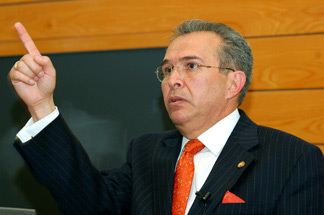Forthcoming Nicaraguan election is a critical turning point, the nation's OAS ambassador stresses on campus visit
By Kanika Arora

The outcome of Nicaragua's forthcoming Nov. 5 elections -- in which four viable parties are competing for the presidency and 92 assembly seats -- will be a critical turning point for the poverty-stricken Central American country. It also will have far-reaching international political and economic ripples, according to a Nicaraguan diplomat speaking at Cornell Oct. 12.
Jose Luis Velazquez Pereira, permanent representative of Nicaragua to the Organization of American States, discussed the potential impact of the forthcoming elections to an audience in Lewis Auditorium of Goldwin Smith Hall.
Five candidates are competing for the presidency. Daniel Ortega, former president of Nicaragua (1985-90) and member of the Sandinista National Liberation Front (Frente Sandinista de Liberacion National-FSLN), is currently leading in the polls with about 30 percent of the vote.
Said Velazquez: "Ortega's alignment with Venezuelan President Hugo Chavez and Cuban leader Fidel Castro can take the country's political landscape to a new level of complications." Chavez, he said, has already offered heavily subsidized fertilizer and fuel to villages controlled by Ortega-friendly governors in an effort to impact the election result.
Ortega, he claimed, "is responsible for the mess of the Nicaraguan revolution, and people fear his return to power. In more ways than one, the count of the anti-Ortega vote will matter the most in this election."
Velazquez has held positions in the Marxist Sandinista government (in power from 1979 to 1990) as well as in the freely elected governments of Violeta Chamorro (1990-96) and the current president (since 2002) Enrique Bolaños Geyer, and he has authored several works on revolutionary movements in Nicaragua.
Velazquez noted that the transition to democracy since 1990 has been challenging, with persistent problems of high inequality and poverty. "Until 2002, it seemed as if the country's engine of growth was completely shut: We hardly produced enough to support our own consumption," he said.
With a per capita income of less than $800, Nicaragua is one of the poorest countries in the Western Hemisphere. "Recently, after signing the CAFTA [Central America Free Trade Agreement], the country witnessed a spurt in exports and the GDP growth rate," said Velazquez. "Choosing the right economic policies and democratic partners will definitely have implications for the large majority of the country's poor. That is why the results of this election can prove to be a turning point for Nicaragua."
The event was co-sponsored by the Latin American Studies Program, Cornell chapter of Bridges to Community, the College of Agriculture and Life Sciences, Cornell Institute for Public Affairs, Department of Government and the Jerome Holland International Living Center.
Kanika Arora is a writer intern with the Cornell Chronicle.
Media Contact
Get Cornell news delivered right to your inbox.
Subscribe